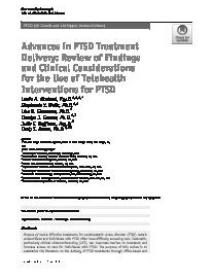Advances in PTSD Treatment Delivery : Review of Findings and Clinical Considerations for the Use of Telehealth Interventions for PTSD
Purpose of review
Effective treatments for posttraumatic stress disorder (PTSD) remain underutilized and individuals with PTSD often have difficulty accessing care. Telehealth, particularly clinical videoconferencing (CVT), can overcome barriers to treatment and increase access to care for individuals with PTSD. The purpose of this review is to summarize the literature on the delivery of PTSD treatments through office-based and home-based videoconferencing, and outline areas for future research.
Recent findings
Evidence-based PTSD treatments delivered through office-based and home-based CVT have been studied in pilot studies, non-randomized trials, and randomized clinical trials. The studies have consistently demonstrated feasibility and acceptability of these modalities as well as significant reduction in PTSD symptoms, non-inferior outcomes, and comparable dropout rates when compared with traditional face-to-face office-based care. Finally, it has been shown that using CVT does not compromise the therapeutic process.
Summary
Office-based and home-based CVT can be used to deliver PTSD treatments while retaining efficacy and therapeutic process. The use of these modalities can increase the number of individuals that can access efficacious PTSD care.
Geachte bezoeker,
De informatie die u nu opvraagt, kan door psychotraumanet niet aan u worden getoond. Dit kan verschillende redenen hebben,
waarvan (bescherming van het) auteursrecht de meeste voorkomende is. Wanneer het mogelijk is om u door te verwijzen naar de bron
van deze informatie, dan ziet u hier onder een link naar die plek.
Als er geen link staat, kunt u contact opnemen met de bibliotheek,
die u verder op weg kan helpen.
Met vriendelijke groet,
Het psychotraumanet-team.
In: Current Treatment Options in Psychiatry ; ISSN: 2196-3061 | 7 | 221-241
https://doi.org/10.1007/s40501-020-00215-x
Open Access


